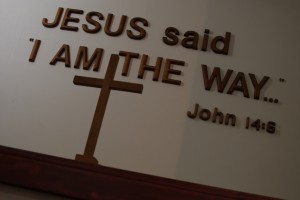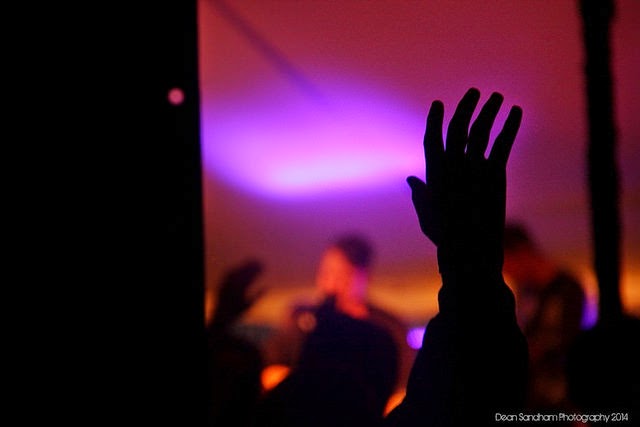We've all been there; maybe in a home group, or before church, or after music practice, on a camp or even in a deacons or elder's meeting; but I am sure we've all experienced sitting as a group of Christians to pray together and finding yourself enduring minutes of awkward silence.

I don't get it... when we say we are going to pray let's pray! To be honest I do remember as a teen feeling unfit or unprepared to pray when an older person pulled us together to pray, that was immaturity on my part and I can understand younger people could feel a bit uncomfortable, so I try and find other ways to pray with teens say at youth group or in small groups on a high schooler's camp.
But for Christians who have been in the faith long enough to experience the maturity of the Gospel impacting truth to change who you are (which is different for all people, and I know many young people who do this so not saying teens can't), then praying, even in a group, should come naturally.
So why the awkward silence? I have a few ideas I feel need to be addressed.
1. You don't pray on your own
Why would you feel comfortable talking to Jesus with other people around if you aren't comfortable doing it on your own? But as I sit in a silent circle and consider what's going on I have to say this is the saddest reason straight up. I mean prayer is a life-source for Christians, communicating with the one who saved you, who loves you has to be the most uplifting thing a Christian can do. If people don't do this their faith
will go stale... so how scary is that thought if you're in a prayer circle with youth leaders, or deacons and this is the reason behind the silence. First and foremost we must be communicating with God ourselves, so that our relationship and faith is growing, fresh, healthy and foundational.
2. People aren't taught how to pray
Some people have a gift of prayer. From the moment they meet Jesus they are in constant communication with Him. It is the first thing they think of when they wake up, the last thing they do as they fall asleep and they relish every moment in between to talk to God. I am not one of those people, and I know many are not like that. For me it took years to understand God, understand prayer, to learn from others, to learn from Jesus and Scripture. I mean before Jesus shares 'The Lord's Prayer' with the disciples he says this; "this is how you should pray...". Jesus knew the disciples needed some guidance, so we should not think that we don't either.
So do we teach people how to pray? As a pastor I reflect and wonder if we do it well, or if we just get everyone in a circle, hold hands, close our eyes and expect each person to know what they are doing. I think as pastors we need to intentionally do some teaching on prayer, and its importance.
3. People aren't living in Gospel community
Today's western society is a very individualistic society. When people live lives individually then it inherently lets selfishness creep in. It may be controversial but I think the selfishness of independence ruins churches, not just corporate prayer. However since it is the prayer circle we are talking about here let's leave the wider issue and just look at how it impacts this. 'My faith is my thing'; 'Prayer is personal'; 'I don't want others to know what's going on'... these are all reasons people don't pray and
they are all inherently selfish. Right at the beginning, we hear that the church in Jerusalem was totally unified in all they did and committed themselves to teaching and prayer. I am sure in their unity they didn't see prayer as a personal individual thing. It was their opportunity to talk to Jesus together, and knowing that Jesus was God, saviour, conqueror, king, and brother they knew their needs could be met, their inhibitions blown away, their sins forgiven and their identities only found in Him. Because of that they recognised they (all together) were the same, and individualism had no place because they now all had the same standing that they were simply
'in Christ'. That's a Gospel community, that's what I want to see our home groups, youth groups, worship teams, leadership teams and entire churches living in, but it comes at the cost of selfish individualism.
4. The prayer circle isn't right for the current context
Group dynamics are different from group to group. There are different ways to pray in groups, sometimes there are better ways than just talking about a list of prayer points and then closing our eyes and expecting people to repeat them now as we pray. But somehow the traditional prayer circle has become something we cling to, even when it constantly is met with minutes of awkward silence before finally the leader puts everyone out of their misery by praying and saying "Amen". If it is a constant issue for your group, and you have addressed the previous three points, then maybe look at a different way to pray together. Maybe getting people to write on paper a few worries and a few praises and then read them out to the group after which someone can commit them all to God in prayer. Maybe incorporate music to centre people's hearts, or go for what I call the 'African prayer' where everyone talks allowed at the same time, praying individually to God but as a unified group (that's how we did it in The Gambia all the time). Maybe you could use Jesus' teaching and step through the Lord's Prayer and stop at each element and have people share what's going on in their lives regarding say 'seeing God's kingdom come' or 'giving us our daily bread'. There's no prescribed way to do corporate prayer, so don't cling to something that isn't working.
It breaks my heart to sit in silence when a group has turned to God in prayer. I long for a community of people who themselves long to communicate with Jesus and so at any opportunity express their thanks, their love and their need of Him. Those are rich corporate prayer times. So I am not content to let awkward silence prevail, either lives need changing, people need more understanding, selfish individuality needs to be crushed or we need to find a new way to talk to Jesus together. Let's at least commit to trying to enhance and better the way we pray together!
**I am aware I have not quoted Scripture in this post, and merely paraphrased without giving reference at times. I anticipated a conversational styled post here, but am happy to give further references if people want, just contact me.



















 John Piper
John Piper 








